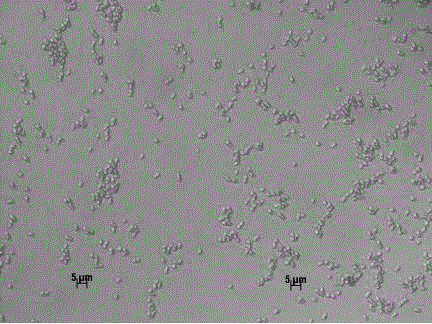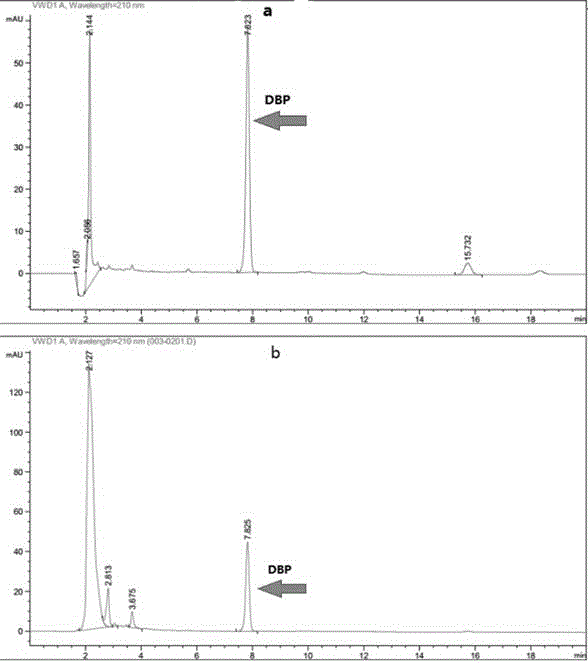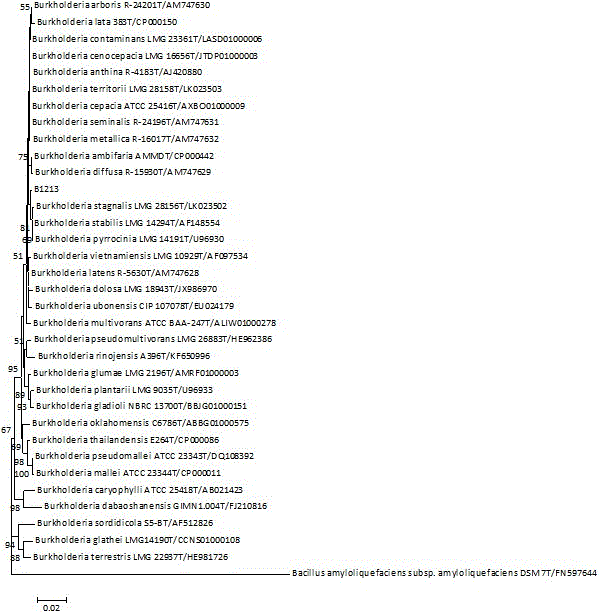Burkholderia pyrrocinia and application thereof
A technology of Burkholderia pyrrole and Holderia, which is applied in the direction of bacteria, biochemical equipment and methods, microorganisms, etc., to achieve the effects of high degradation rate, simple operation, and short degradation cycle
- Summary
- Abstract
- Description
- Claims
- Application Information
AI Technical Summary
Problems solved by technology
Method used
Image
Examples
Embodiment 1
[0034] Identification of Example 1 bacterial strain B1213
[0035] Strain B1213 was isolated from soil, and its morphology was as follows figure 1 As shown, it is a rod-shaped Gram-negative bacteria that cannot form spores. Genomic DNA was extracted, and the genomic DNA was subjected to polymerase chain reaction (Polymerase Chain Reaction, PCR) using 16s rDNA and BCR1 primers to propagate specific DNA sequences, and the National Center for Biotechnology Information (National Center for Biotechnology Information, NCBI) database for strain comparison.
[0036] (1) 16S rDNA sequence analysis:
[0037] 16s rDNA forward primer 27F: 5'-AGA GTT TGA TCC TGG CTC AG-3', as shown in SEQ ID NO.1;
[0038] 16s rDNA reverse primer 1492R: 5'-ACG GTT ACC TTG TTA CGA CTT-3', as shown in SEQ ID NO.2;
[0039] The amplified 16S rDNA sequence is shown as SEQ ID NO: 3, and the full length of the sequence is 1411bp. The amplified 16S rDNA sequence was compared with the gene sequence of the re...
Embodiment 2
[0045] Example 2 Preparation of Burkholderia pyrrole B1213 Liquid Shake Flask Culture Solution
[0046] (1) Slant culture: Burkholderia pyrrole B1213 was inoculated on the slant medium and cultured at 40° C. for 48 hours to obtain the slant strain. The slant medium used contained the following ingredients per 1L: 2.0g glucose, 1.0g peptone, 0.5g yeast extract, 1.8g agar, the rest of distilled water, neutral pH, and sterilized at 115°C for 20 minutes.
[0047] (2) Take the slant strain and inoculate it into the sterilized seed culture medium, and incubate at constant temperature and shaking for 24 hours under the conditions of 175 rpm and 30°C to obtain the seed culture solution. The seed medium used contains the following ingredients per 1L: 0.5g of ammonium sulfate, 4.0g of sodium chloride, 0.5g of potassium phosphate trihydrate, 0.4g of magnesium sulfate heptahydrate, 15g of agar powder, 5g of yeast extract, and the rest of distilled water , pH7.0, sterilized at 121°C for 2...
Embodiment 3
[0049] Example 3 DBP standard curve formulation and content determination
[0050] (1) High-performance liquid chromatography (HPLC) to make a standard curve: take 600 μL of DBP and use methanol as a solvent to prepare a 1 mg / mL DBP solution. After diluting ten times, take 0.2 mL, 0.4 mL, 0.6 mL, 0.8 mL, Dilute 1.0mL, 1.2mL, 1.4mL into 2mL centrifuge tubes, that is, the concentration gradient (μg / mL) is 10, 20, 30, 40, 50, 60, 70 respectively, filter with 0.45μm organic filter membrane and place in liquid Phase vials to be tested. The HPLC detection conditions in Example 3 are: the chromatographic column is Sepax Gp-C18 column (150mm*4.6mm, 5.0μm); the mobile phase is acetonitrile-water (83:17, V / V); the injection volume 10μL; flow rate 1.0mL / min; column temperature 25C°; UV detector wavelength 210nm. Take the peak area of DBP as the abscissa and the concentration of DBP as the ordinate to make a standard curve; then obtain the peak area-concentration equation.
PUM
 Login to View More
Login to View More Abstract
Description
Claims
Application Information
 Login to View More
Login to View More - R&D
- Intellectual Property
- Life Sciences
- Materials
- Tech Scout
- Unparalleled Data Quality
- Higher Quality Content
- 60% Fewer Hallucinations
Browse by: Latest US Patents, China's latest patents, Technical Efficacy Thesaurus, Application Domain, Technology Topic, Popular Technical Reports.
© 2025 PatSnap. All rights reserved.Legal|Privacy policy|Modern Slavery Act Transparency Statement|Sitemap|About US| Contact US: help@patsnap.com



